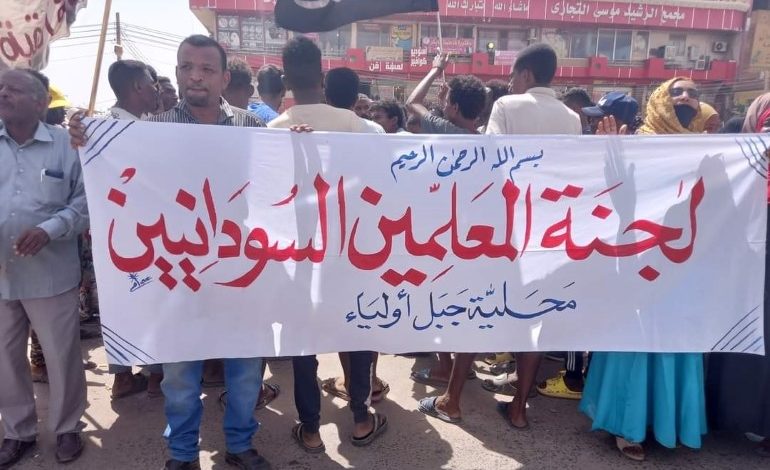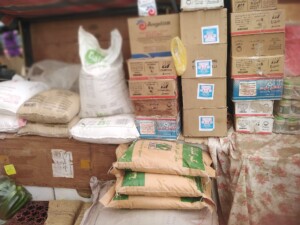Sudan Trade Union Front demands payment of civil servants’ dues

State school teachers in Jebel Aulia in southern Khartoum, call for better pay, December 2022 (Social media)
KHARTOUM / PORT SUDAN –
The Sudanese Trade Union Front (TUF) demands from the Ministry of Finance to make the necessary arrangements to pay the delayed salaries to the civil servants in the country. The ministry is able to pay the security forces but reportedly lacks resources to disburse the salaries of other employees.
The TUF alliance of eight professional bodies*, including the Sudanese Journalists Syndicate, the Doctors Union committee, and the Teachers Committee, said yesterday that the armed conflict that broke out in the country on April 15 “has created a catastrophic reality for both state employees and staff of the private sector”.
The Front “holds the Sudanese Ministry of Finance and the government fully responsible for the abject failure to pay the salaries since April” and demands that they “carry out their duties towards workers in state institutions and pay their dues immediately and without any delay,” leading TUF member Atiya Abdallah told Radio Dabanga.
“Remuneration is an inalienable right of workers under national laws and international labour standards, and we reserve our full right to defend this right through all legal and trade union means in a timely manner.”
He said that the workers are living in tragic conditions as they did not receive their dues on time.
The Sudanese Teachers’ Committee considers the non-payment of salaries for three months “a crime against the workers and their families”.
The teachers committee that “the inconsistency in the statements made by those in charge of the matter in the de facto government. This confirms they follow the decision issued by the highest sovereign body since April 15, which is not to pay salaries during this war except to the security forces”.
A senior official at the Finance Ministry acknowledged financial and technical problems related to banking systems and lack of liquidity which prevent the payment of salaries.
Loans
Online newspaper El Taghyeer yesterday quoted the director of the ministry’s Financial and Administrative Affairs department who said on social media that “the current problems caused losses in revenues to the Khartoum public treasury of more than 90 per cent”.
He explained that the “very small amount of collected revenues” is disbursed in accordance with the directives of the High Emergency Committee, which is to pay salaries and food supplies to the regular (military, security, and police) forces.
In addition, the revenues are used for the provision of life-saving medicines to patients, the transport and storage of relief materials, spare parts for maintenance, and drinking water purification materials in Khartoum and other major cities.
The High Emergency Committee has instructed the Finance Ministry to pay advances on salaries at a rate of 60 per cent for employees and 100 per cent for workers who are continuing their work in parts of the country not affected by the fighting.
The Central Bank of Sudan is providing the Finance Ministry with loans “to cover the salaries of the regular forces and the war effort,” the finance expert said. “The ministry’s liquidity position does not allow taking more loans to cover salaries of civil servants or any other expenses.”
In early May, Jibril Ibrahim, Minister of Finance and Economic Planning and leader of the Justice and Equality Movement, announced ongoing efforts to pay salaries of civil servants, but it seems that these efforts stranded.
The economy was already in deep stagnation before the outbreak of violent hostilities between the Sudan Armed Forces (SAF) and the paramilitary Rapid Support Forces (RSF) on April 15. Many banks and factories have been forced to close, as they cannot be safely operated, which resulted in scarcity of cash flow and food supplies.
Economist Haisam Fathi told Radio Dabanga earlier this week that the estimated financial losses caused by the ongoing war over the past three months amount to $9 billion (roughly $100 million per day), while the value of property and goods plundered is estimated at another $40 billion.
* After Omar Al Bashir had taken power by a military coup in 1989, he banned the trade unions in the country, to forestall the sort of revolt that had toppled previous leaders. His regime then set up its own trade unions and appointed affiliated Islamists on leading positions. Following the ousting of Al Bashir in 2019, these unions were dissolved and the various professional groups were given the opportunity to set up ‘real syndicates and unions’ again. Journalists were the first to establish a syndicate and appoint elected leaders. Other groups, including medical doctors and engineers, were in the process of setting up a union but when the October 2021 coup d’état led to the reinstatement of the former trade unions, they were forced to postpone the undertaking.











 and then
and then